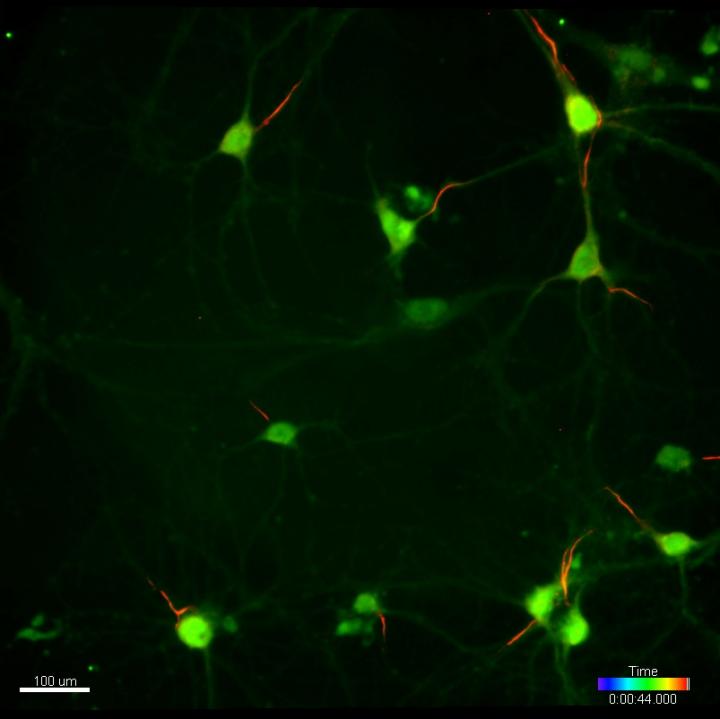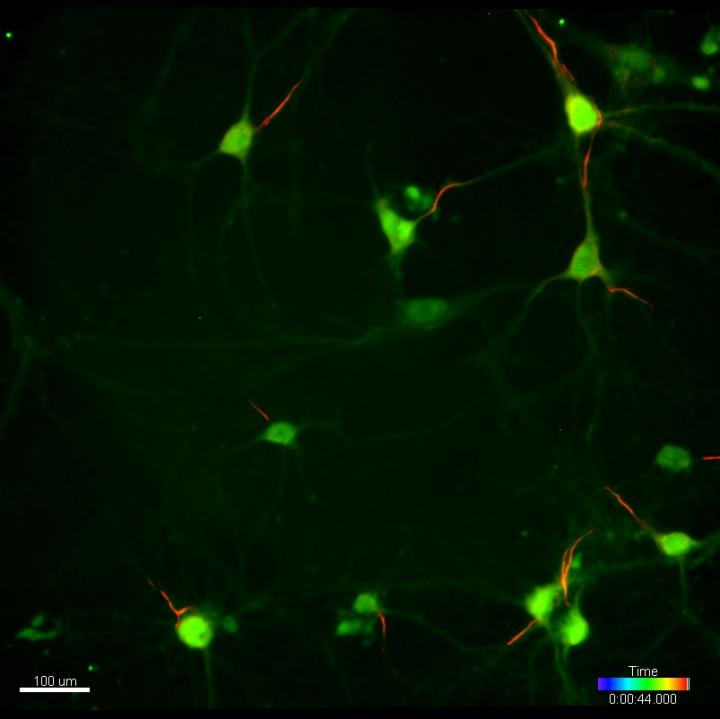
Credit: Image courtesy of Dr. Patrick Mulholland, Medical University of South Carolina
A handful of FDA-approved drugs exist for treating individuals with alcohol use disorder but they have been largely ineffective at reducing the high rates of relapse. As such, there remains a critical need to identify and develop alternative pharmacological treatment options.
Researchers at the Medical University of South Carolina (MUSC), through collaborative efforts with the NIH-funded INIAstress Consortium, have identified novel potassium (K+) channel genes within addiction brain circuitry that are altered by alcohol dependence and correlate with drinking levels in a mouse model of alcohol drinking.
Significant reduction of heavy alcohol drinking after administration of a KV7 channel-positive modulator validated Kcnq, one of the identified genes that encodes KV7 type K+ channels, as a potential pharmacogenetic target. These preclinical findings, published in the February 2017 special issue of Alcohol on mouse genetic models of alcohol-stress interactions, suggest that K+ channels could be promising therapeutic targets that may advance personalized medicine approaches for treating heavy drinking in alcoholics.
Alcohol is known to change how neurons fire, and K+ channels play a crucial role in modulating a neuron's excitability by returning the cell membrane potential back to baseline after the neuron has fired an action potential. Although there is an old literature that links K+ channels and alcohol use disorder, the alcohol field has not actively pursued this line of research.
Recently, the MUSC research team lead by Patrick J. Mulholland, Ph.D., associate professor of Neuroscience and Psychiatry & Behavioral Sciences and senior author on the article, revisited this research area in a novel way. By applying new genomic database technologies, the team became the first to use an experimental genetic bioinformatics approach to determine the relationship between expression levels of brain K+ channel genes with alcohol consumption.
"We looked at all 79 K+ channel genes in an alcohol drinking model using genetically diverse strains of mice and were trying to find the genes that might be risk genes for drinking and the genes that are changed by alcohol dependence," said Mulholland. "More critically, we wanted to determine how alcohol changed expression of K+ channel genes and how those changes predicted how the mice drank after they were rendered dependent. In other words, we wanted to know what the mechanisms are that facilitate enhanced drinking in alcohol dependence."
In this preclinical study, INIAstress researchers exposed strains of mice with diverse genetic backgrounds and varied drinking behaviors (BXD recombinant inbred) to alcohol drinking bottles. Half of the mice remained on this protocol and represented non-dependent mice (i.e., mice that consumed alcohol but were not rendered dependent). Alcohol dependence was induced in the other half of mice using a chronic intermittent ethanol exposure model. After 10 weeks, microarray analyses were completed in the prefrontal cortex and nucleus accumbens. Mulholland and colleagues then performed a targeted analysis of K+ channel genes and alcohol drinking in BXD strains using the GeneNetwork software system.
In non-dependent mice, expression levels of several K+ channel genes significantly correlated with the amount of alcohol consumed. Along with identifying novel genes (e.g., Kcnd2), the findings validated genes that were previously implicated in alcohol use disorder.
In particular, low expression levels of Kcnq genes were significantly correlated with high drinking levels. As these correlations were seen prior to dependence, they may represent risk markers for heavy alcohol consumption.
In dependent mice, the expression levels of Kcnq5 were significantly dysregulated across BXD strains, and as the researchers expected, these gene adaptations correlated with the degree of escalated drinking during dependence.
Mulholland and his team were particularly excited by the findings implicating Kcnq genes and KV7 channels in non-dependent and dependent drinking behavior as these findings replicated their previous study in rats (published November 2016 in Addiction Biology). In this prior study, retigabine, an FDA-approved KV7 channel-positive modulator, significantly reduced alcohol consumption in high-drinking non-dependent rats. This study was the first to identify KV7 channels and Kcnq genes as a potential target to reduce heavy drinking.
To further validate Kcnq as a therapeutic target, the researchers induced chronic alcohol drinking in a strain of mice with high drinking behavior (C57BL/6J). After seven weeks, the mice were treated with retigabine. Consistent with the rat studies, retigabine significantly reduced alcohol consumption in high-drinking non-dependent mice. These findings were also consistent with clinical evidence in humans that mutations in KCNQ genes associate with early-onset alcohol dependence.
Together, these studies provide strong genetic and pharmacologic evidence that KV7 channels and KCNQ genes are promising pharmacogenetic targets for treating alcohol use disorder.
"With all of the preclinical and clinical genetic evidence linking KV7 channels and heavy drinking, it would be great to have a precision medicine follow-up study examining the relationship of KCNQ single-nucleotide polymorphisms (i.e., mutations) with retigabine's response at reducing heavy alcohol drinking and alcohol relapse," said Mulholland.
Given that retigabine is an FDA-approved drug, its use in a clinical trial on alcohol use disorder is theoretically feasible. However, there is a roadblock to clinical trial development since retigabine's manufacturer recently announced they will stop making the drug due to commercial reasons.
Fortunately, the path to translating these promising preclinical findings to humans does not end here.
"There are better drugs that target KV7 channels that are available on the preclinical side," said Jennifer A. Rinker, Ph.D., postdoctoral fellow in the Department of Neuroscience and first author on the Alcohol paper. "For example, retigabine hits most of the KV7 channel subtypes. There are selective drugs that target just two of the subunits instead of all of them. That's where we are headed, to figure out which of the subunits are critical for the effects of retigabine to reduce drinking."
###
About MUSC
Founded in 1824 in Charleston, The Medical University of South Carolina is the oldest medical school in the South. Today, MUSC continues the tradition of excellence in education, research, and patient care. MUSC educates and trains more than 3,000 students and residents, and has nearly 13,000 employees, including approximately 1,500 faculty members. As the largest non-federal employer in Charleston, the university and its affiliates have collective annual budgets in excess of $2.2 billion. MUSC operates a 750-bed medical center, which includes a nationally recognized Children's Hospital, the Ashley River Tower (cardiovascular, digestive disease, and surgical oncology), Hollings Cancer Center (a National Cancer Institute designated center) Level I Trauma Center, and Institute of Psychiatry. For more information on academic information or clinical services, visit musc.edu. For more information on hospital patient services, visit muschealth.org.
Media Contact
Heather Woolwine
[email protected]
843-792-7669
@MUSChealthPN
http://www.musc.edu
############
Story Source: Materials provided by Scienmag





